Brand marketers are getting harder to tell apart from techies lately, in these heady days of the ascendancy of online advertising. This most targetable and measurable ad medium the world has ever known seems to be a breeding ground for a new class of ad professional — not so much right-brainers or left-brainers now as center-brainers. I guess it’s a fusion of the softer side of branding with the harder side of numbers, mixed in with algorithms and Javascript and Flash and Ajax and widgets and a whole lot of other things geek. 
A good cross-section of the rapidly growing ranks of these savvy new online marketers gathered this week to listen to leading voices, talk shop, learn new techniques, mingle, and party at a midsummer’s conference in the heart of middle America. It was ad:tech Chicago — one of ten such events globally this year, four of them in the U.S. — and it was held for the first time at the popular Navy Pier tourist haven that stretches out over Lake Michigan from downtown Chicago. The venue was spectacular, the lake was blue, the spirits were high, the buzz was flowing, and the topics were as hot inside the conference center as the summer temps were out. 
Sky’s the Limit
With online advertising at $20B a year and going nowhere but up, it’s safe to conclude this profession is a good place to be. The conference was strong, the promoters told me, and this is actually one of their smallest U.S events. More than 3000 showed up for a packed, two-day agenda. The showfloor’s 70-some exhibitors provided a lesson for anyone in how to hawk their wares — after all, these are marketing companies, folks! Big technology players like Google, DoubleClick, WebTrends, Omniture, and Advertising.com all were present, along with many email marketing firms, large online agencies, and whole raft of smaller players bringing new tools to bear in areas such as RSS, mobile, and video advertising. 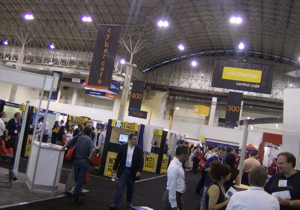 It was hard for even an experienced ad guy and marketer like me to take it all in over two days — but I tried anyway.
It was hard for even an experienced ad guy and marketer like me to take it all in over two days — but I tried anyway.
No More Pre-Rolls?
The coolest new tech company I found, as I mentioned in a previous post, was from the Netherlands: Adjustables. They were showing, for the first time in the U.S., a patent-pending technology for placing non-intrusive ads within video streams. Very cool stuff. You have to see it, which you can here do in this online demo.
The company’s Windows-based “AdDesigner” is a tool that lets you create these Adjustables™ for your online video streams, in any of four different types. AdDesigner automatically saves your Adjustables to the AdServer. You also need the company’s “AdScheduler,” which places the Adjustables™ you created within your videos. Software for both products can be downloaded from the company’s site for free.  Standards are needed here badly, and soon — and this technology could very well jolt the industry into some action. Adustables is a recently VC-funded startup, and had actually just announced their technology at the ad:tech conference in Hamburg not long ago. But I was glad to find them at their U.S. debut event and be the first to blog about them.
Standards are needed here badly, and soon — and this technology could very well jolt the industry into some action. Adustables is a recently VC-funded startup, and had actually just announced their technology at the ad:tech conference in Hamburg not long ago. But I was glad to find them at their U.S. debut event and be the first to blog about them.
I spoke with Menno Biesiot, cofounder and VP marketing of Adjustables, about the still untapped field of in-stream video advertising.  An article just appeared yesterday on this very topic and said this: “The core issue that keeps advertisers from sponsoring video content is simply the lack of technology, creative and industry standards, with integration standards being the greatest barrier to adoption. It’s important to note that this is not integrating banners or search listings on a page. This is about delivering real-time video ads into a video player.” The reaction of Adjustables’ Biesiot: “I totally agree that core issue is a lack of technology. It’s really amazing that, in this time of the booming online video market, that ad models are still so limited. Right now, only pre-rolls (and post- and mid-rolls) offer a solution to monetize online video content. But that model is far from ideal — it’s just a copy of the television model, with commercial breaks, applied to the new world.” I asked how he felt after two days in Chicago talking about the Adjustables solution: “The conference was good for us, though the real evaluation can be made two months from now, I think … People involved in online video were amazed about the solution, very enthusiastic, and willing to start ASAP with Adjustables. Their reaction was that our solution could be the new standard. Let’s see.” Indeed….
An article just appeared yesterday on this very topic and said this: “The core issue that keeps advertisers from sponsoring video content is simply the lack of technology, creative and industry standards, with integration standards being the greatest barrier to adoption. It’s important to note that this is not integrating banners or search listings on a page. This is about delivering real-time video ads into a video player.” The reaction of Adjustables’ Biesiot: “I totally agree that core issue is a lack of technology. It’s really amazing that, in this time of the booming online video market, that ad models are still so limited. Right now, only pre-rolls (and post- and mid-rolls) offer a solution to monetize online video content. But that model is far from ideal — it’s just a copy of the television model, with commercial breaks, applied to the new world.” I asked how he felt after two days in Chicago talking about the Adjustables solution: “The conference was good for us, though the real evaluation can be made two months from now, I think … People involved in online video were amazed about the solution, very enthusiastic, and willing to start ASAP with Adjustables. Their reaction was that our solution could be the new standard. Let’s see.” Indeed….
Chock Full o’ Content
While the overriding theme of the this year’s event was on “driving performance,” with an obvious emphasis on ROI and metrics, hot topics also included social networking, behavioral targeting, viral marketing, user-generated content, mobile marketing, ad networks and exchanges, and…well, lots more! To get the full-on firehose, available speaker presentations are being posted here. And, within about two weeks, I’m told that podcasts of all the conference sessions will be be available here.
Near the close of the event, I spoke with Warren Pickett, content director for the ad:tech conferences, to get his take: “We’re quite happy with both the new venue and the attendance. One analyst I know told me this event was the best ad:tech he’s attended out of seven or eight so far.” What does the future hold? “We’re looking forward to continued growth. The online ad industry is just explosive. And we continue to listen to the analysts, to get the best of them here to our events, and help people keep up on the latest.”
My Favorite Session
The opening keynote panel on the second day was one I was really looking forward to, and I was right down in front to take it in. The slide here tells it all, including the speakers, so I won’t repeat. I was particlularly intrigued to hear from the head of the Wall Street Journal’s new TV and online video network after the News Corp deal had just been announced, and to get some of the latest scoop from YouTube. 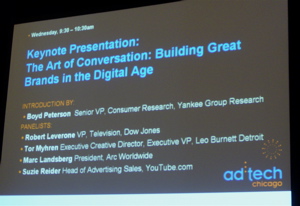 The two agency execs on the panel had some great insights as well.
The two agency execs on the panel had some great insights as well.
Boyd Peterson from Yankee was a stand-out moderator, noting in his kickoff that “this is a fantastic time to be in the business.” But, he said, the key is really how do brands use all this new technology? That was the topic of the hour. 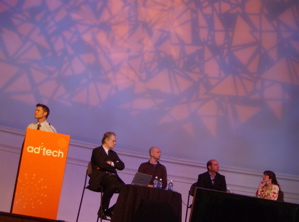
Robert Leverone joined Dow Jones in 2005 with the MarketWatch acquisition. He described his new “WSJ Digital Network” as bringing together the video assets of WSJ.com, MarketWatch, Barron’s, and their new AllThingsD.com site, which I’ve written about previously. He told me later that Walt and Kara are loving their new, added roles as video reporters/producers. “We gave a bunch of reporters HD video cams, and they’re having a ball.” Glad to hear that, since it was no secret many on the editiorial side weren’t so excited about the pending News Corp acquisition. But Robert said he certainly doesn’t see any wholesale departures of reporters and editors under the new regime. Life will go on, and I think it’s fair to say that video has a big future at the Journal. I also couldn’t help but ask about News Corp’s coming launch of its Fox Business Network, which will directly compete with CNBC, with whom the Journal has a partnership. “Yes, we have to look at that contract,” he said. Robert noted his firm is a big fan of Brightcove, skinning that video player for their various uses. (See my previous coverage of Brightcove by typing the word into my Lijit search box.) We also talked about our mutual friends here in Minneapolis, where Dow Jones Online is based (going back to its days as BigCharts, which was acquired by MarketWatch).
So, what’s up with YouTube? Well, Suzie Reider, head of ad sales there, told us that, after only 18 months of existence, it’s now the eighth largest web site, with hundreds of millions of videos streamed monthly. “We’re even humanizing politics,” she said, referring to the recent “Snowman” video (produced in Minneapolis, I might add). “We’re giving consumers the tools for the conversation to begin.”
A great question the moderator threw out later was this: “At what point does the agency lose control, with brands just starting to do videos themselves, like consumers?” And that brought a couple of good reactions. “Oh, they’ve long lost control!” said Marc Landsberg of Arc, referring to the consumer. “But take Apple, for example — they love the fun videos people are producing about them and their products. Consumers are gonna do it — just give ’em the tools! You’re not going to be able to control the world of user-generated content.” Suzie Reider of YouTube provided another insight when she said General Mills, to name one, is now looking at all the quirky videos consumers are producing about their products and thinking about how to use them in producing its own. “How do we expand or play off of those?”
Buy, Sell, or Hold?
Boyd Peterson of Yankee threw out an interesting exercise for the panelists, asking them to rate a few key forces in today’s online scene.
– Second Life: buy, sell or hold? All said sell, with only Dow Jones saying hold. Leo Burnett’s Myhren: “Pontiac got in early, and we caught a huge media wave. But they did hit a peak.”
– Facebook: buy, sell or hold? This one was no surprise — all would buy. “Especially since they opened up their platform,” said YouTube’s Reider.
– Advertising on individual blogs: is it acsendant? All said yes.
Here are some more good quips and comments I captured from this panel:
“The Wall Street Journal Digital (TV) Network will be a crown jewel in the new News Corp empire.”
– Robert Leverone, VP Television, Dow Jones
“Do consumers really want to have conversations with brands?”
– Boyd Peterson, SVP Consumer Research, Yankee Group
“If you asked 100 consumers if they wanted to have a conversation with their brands, 100 of them would say no. They just want to be entertained.”
– Tor Myhren, Executive Creative Director, Leo Burnett Detroit
“Some consumers are active participants on the web, some are passive. Lots just look, but they’re still beneficiaries. They may only be observing, but they’re still having their lives enriched.”
– Marc Landsberg, President, Arc Worldwide
“There’s lot more involved in getting people to like a brand than clicks.”
– Tor Myhren, Executive Creative Director, Leo Burnett Detroit
A great audience question: “User-generated video scares a lot of brand managers and CMOs. What should they do?” Suzie Reider of YouTube: “They should hire people for this — watch the comments, react quickly, be proactive.” Another reaction, from Arc’s Landsberg: “Get on social media! Write a blog! You have to understand what ‘it’ is. You have to participate from the inside.”
So, What Did I Hear About “Widgets” at ad:tech?”
Not much. Other than some buzz in the hallways, there were no sessions, per se, that were focused on the topic of widgets. I think it’s too soon. The convergence of widgets with advertising — how they’ll be used within ads, how they will impact ad technology, or metrics, or whatever — is really just beginnning to be talked about. I did see a good article pop up yesterday on ad:tech’s sister site, iMediaConnection.com, entitled The widget: a small tool with a big future. Check it out — good advice for marketers. I’m gonna have to make iMedia a regular stop in my morning reading.
Other ad:tech Quotes of Note
When I recap conferences, I always like to pore over my notes the day after and pick out some of my favorite speaker quotes. Little gems or words of wisdom that sometimes are blurted out so quickly you can easily miss ’em. But I’ve learned to keep my ears peeled for such special insights, and I grabbed a higher than normal quantity of them at this one. Here’s a selection:
“Your brand isn’t what you say it is. It’s what Google says it is.”
– Chris Anderson, Wired Magazine, and author, “The Long Tail”
(Anderson gave the opening keynote, which was recapped nicely on the conference’s own blog here.)
“We don’t want to happen to viral marketing what happened with email marketing (spam).”
– Gary Spangler, Dupont
“Make meaning, not buzz….ask new questions…is your topic ‘talk worthy’? … Word-of-mouth marketing is making your customers feel heard.”
– Lois Kelly, Foghound, and author, “Beyond Buzz”
“Amplification of user voice leads to greater brand transparency.”
– Amy Shenkan. McKinsey & Company
“A form of ‘wiki branding’ is going on, where consumers are in control of not just the media but the brand itself, and they’re taking their version of what that brand means into their own circle of influence.”
– David Murphy, Co-President, Barrie, D’Rozario and Murphy
Wiki branding…hmmm, interesting. Never heard it put that way. Not meaning actual wikis being formed around all the brands out there, of course (although that does happen) — but the notion of the collective consumer conversation around a brand being what the brand really is. That, I think, is the exclamation point on this whole event. The one big takeaway.
See you at the next conference!
[Note: I also did a brief guest post about my ad:tech Chicago experience for Read/Write Web.
And all my photos are now up on Flickr, tagged “ad:tech Chicago 2007.”]
 It’s hard to argue that the man doesn’t see the big picture. This recent article in the New York Times tells the story very well:
It’s hard to argue that the man doesn’t see the big picture. This recent article in the New York Times tells the story very well:  On hard times lately, the agency recently announced that its chairman, Pat Fallon, was
On hard times lately, the agency recently announced that its chairman, Pat Fallon, was 

 It was hard for even an experienced ad guy and marketer like me to take it all in over two days — but I tried anyway.
It was hard for even an experienced ad guy and marketer like me to take it all in over two days — but I tried anyway.  Standards are needed here badly, and soon — and this technology could very well jolt the industry into some action. Adustables is a recently
Standards are needed here badly, and soon — and this technology could very well jolt the industry into some action. Adustables is a recently  An
An  The two agency execs on the panel had some great insights as well.
The two agency execs on the panel had some great insights as well.
 I know its painful for you purists out there (trust me, it hurts me, too), but I just can’t fit in my big camera at these things. I have to travel light. These will still give you a feel for things, I hope, here at
I know its painful for you purists out there (trust me, it hurts me, too), but I just can’t fit in my big camera at these things. I have to travel light. These will still give you a feel for things, I hope, here at  (Times getting tough, Eric? I know you’re trying to control that headcount now, but why is the party budget always the first to go?) I did hear WebTrends took some people to the Cubs-Phillies game, but that was about it. There were likely other, smaller gatherings, however — with 3000-some people at this thing. The majority of the attendees turned out for this one, big, official party, however (sponsored by CIMA) — so, it was mobbed. One free drink ticket and some minimal muchies — whoopie. But everyone seemed to be having fun, whether indoors in the AC, or out in the humid air on the crowded, narrow deck alongside the river.
(Times getting tough, Eric? I know you’re trying to control that headcount now, but why is the party budget always the first to go?) I did hear WebTrends took some people to the Cubs-Phillies game, but that was about it. There were likely other, smaller gatherings, however — with 3000-some people at this thing. The majority of the attendees turned out for this one, big, official party, however (sponsored by CIMA) — so, it was mobbed. One free drink ticket and some minimal muchies — whoopie. But everyone seemed to be having fun, whether indoors in the AC, or out in the humid air on the crowded, narrow deck alongside the river.  (How do I always manage to meet surfers at conferences? Global tribe, indeed…) He covers the Midwest, so had recently been in Mpls to meet with Target. He said he’s hearing advertisers wanting technology that would let web users pull widgets off their ads to put onto their own SN sites. Pretty cool. Also ran into Manoj Jasra, director of technology for B2B search firm Enquiro in British Columbia. He’s here blogging for his own blog and has a close relationship with WebTrends (but missed the bus to Wrigley Field).
(How do I always manage to meet surfers at conferences? Global tribe, indeed…) He covers the Midwest, so had recently been in Mpls to meet with Target. He said he’s hearing advertisers wanting technology that would let web users pull widgets off their ads to put onto their own SN sites. Pretty cool. Also ran into Manoj Jasra, director of technology for B2B search firm Enquiro in British Columbia. He’s here blogging for his own blog and has a close relationship with WebTrends (but missed the bus to Wrigley Field).
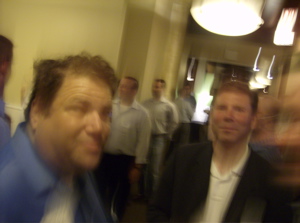 But here goes, Farren: you asked what’s one cool thing we need in online advertising but don’t have yet? Okay, listening? It’s the ability to target brand messages to very specific, pinpointed demographics across all the social networking sites that are proliferating out there — thousands and thousands of them (not just the big ones everyone’s heard of). Think long tail, and because all those SN sites need to monetize to stay alive. That’s just got to happen, and I’m betting it will soon. So, there ya have it!
But here goes, Farren: you asked what’s one cool thing we need in online advertising but don’t have yet? Okay, listening? It’s the ability to target brand messages to very specific, pinpointed demographics across all the social networking sites that are proliferating out there — thousands and thousands of them (not just the big ones everyone’s heard of). Think long tail, and because all those SN sites need to monetize to stay alive. That’s just got to happen, and I’m betting it will soon. So, there ya have it! 
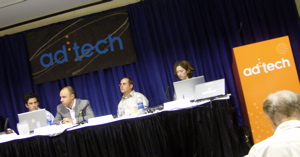 Geoff Atkinson, marketing chief at Overstock.com, reiterated that “traffic is just getting so much more expensive to acquire.” His firm started using BT about a year ago. “When a customer first arrives, for example, we log how he or she got there — by a certain keyword, for example. Then, on the next visit, we know that customer and feed them something that’s relevant.” Brent Hieggelke, VP of strategic marketing at Omniture, said when he first joined the firm, his friends thought all this “on-site targeting was hocus-pocus.” But it’s quickly become for real. His firm calls it “automated 1:1 targeting.” The customer hits the site, and their technology builds a profile. “It’s a self-learning predictive modeling engine,” he said. “The optimal content decision can then be sent to the CMS (content management system).” What data is used to select content? “Site behaviors, temporal aspects (such as time of day), environmental aspects, and referrer values,” he said. “This enables companies to quit having those weekly meetings to decide what goes on on the home page.” It now can all be automated, down to the individual. Hieggelke also noted his firm has found that the log-off page is a great place for targeted ads. “Behavioral targeting is bringing marketing back to the marketing world.” A few good questions then came from the audience. The first was “What percentage of users totally wipe out their cookies regularly?” Omniture’s Hieggelke said he’s seen some say as high as 15-30%. “But we find it’s only in the single digits.” A second question related to customers’ concerns for privacy. “We think it’s important to keep a customer mindset,” said Kefta’s Suchet. “Don’t capture too much data — find just what’s relevant to you.” Omniture’s Hieggelke added: “A customer’s name and social security number has no value to us at all.” Suchet added that BT enables campaigns to be “continually learning, changing — you can’t sit still, you must always adjust based on what competitors are doing and so forth.” A final audience question: When building profiles, what data do you use? “Primarily clickstream data,” said Omniture’s Hieggelke, “because that’s easy. But also data from your CRM system, and whatever else is determined to be predictive. Most companies take existing web analystics data and feed that in first.”
Geoff Atkinson, marketing chief at Overstock.com, reiterated that “traffic is just getting so much more expensive to acquire.” His firm started using BT about a year ago. “When a customer first arrives, for example, we log how he or she got there — by a certain keyword, for example. Then, on the next visit, we know that customer and feed them something that’s relevant.” Brent Hieggelke, VP of strategic marketing at Omniture, said when he first joined the firm, his friends thought all this “on-site targeting was hocus-pocus.” But it’s quickly become for real. His firm calls it “automated 1:1 targeting.” The customer hits the site, and their technology builds a profile. “It’s a self-learning predictive modeling engine,” he said. “The optimal content decision can then be sent to the CMS (content management system).” What data is used to select content? “Site behaviors, temporal aspects (such as time of day), environmental aspects, and referrer values,” he said. “This enables companies to quit having those weekly meetings to decide what goes on on the home page.” It now can all be automated, down to the individual. Hieggelke also noted his firm has found that the log-off page is a great place for targeted ads. “Behavioral targeting is bringing marketing back to the marketing world.” A few good questions then came from the audience. The first was “What percentage of users totally wipe out their cookies regularly?” Omniture’s Hieggelke said he’s seen some say as high as 15-30%. “But we find it’s only in the single digits.” A second question related to customers’ concerns for privacy. “We think it’s important to keep a customer mindset,” said Kefta’s Suchet. “Don’t capture too much data — find just what’s relevant to you.” Omniture’s Hieggelke added: “A customer’s name and social security number has no value to us at all.” Suchet added that BT enables campaigns to be “continually learning, changing — you can’t sit still, you must always adjust based on what competitors are doing and so forth.” A final audience question: When building profiles, what data do you use? “Primarily clickstream data,” said Omniture’s Hieggelke, “because that’s easy. But also data from your CRM system, and whatever else is determined to be predictive. Most companies take existing web analystics data and feed that in first.”
Recent Comments